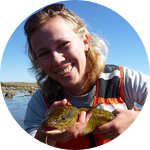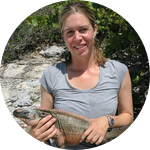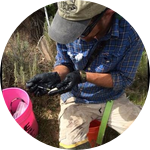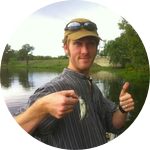About This Project
Stressors like oil and natural gas (ONG) development have rendered many freshwater ecosystems and their inhabitants impaired. Our project will combine field and laboratory studies to assess physiological responses of fishes to stressors associated with ONG development. Changes to stress hormones and immune responses will be evaluated across a gradient of ONG development stressors. Knowledge gained from this study will provide a better understanding of fish adaptation to human stressors.
Ask the Scientists
Join The DiscussionWhat is the context of this research?
ONG development is a globally emergent stressor of concern for freshwater ecosystems. One challenge facing managers is balancing resource extraction and development with wildlife conservation efforts. ONG development has been linked to altered water and habitat quality in many streams, including decreases in vegetation leading to increased temperatures and undesired contaminants. Yet, our current understanding of how this emergent stressor could affect fish physiology is severely lacking.
Stressors that threaten an individual's hormonal balance may manifest through physiological changes that could eventually lead to changes to the population. For this project, we want to better understand how fishes physiologically adapt to stressors commonly associated with ONG development.
What is the significance of this project?
Current knowledge of stress physiology is very limited, with mostly biomedical studies focused on avian and mammalian models with limited studies on reptiles and fishes, especially non-game species that dominate most freshwater assemblages. This project will assess the physiological responses of Mottled Sculpin (Cottus bairdii) and Mountain Sucker (Catostomus platyrhynchus), two commonly abundant non-game fishes in the Western United States. Physiological responses will include differences in blood glucose, cortisol, stress-reactivity, and an individual's ability to mount an immune response. Understanding how fish respond physiologically to stressors will improve our knowledge of stress physiology and species' adaptability to human stressors.
What are the goals of the project?
This research aims to bridge the knowledge gap in our understanding of stress physiology related to human stressors, like ONG development. In the field, physiological responses will be evaluated across streams varying in the level of ONG development with corresponding differences in temperature and salts. Because many exogenous factors could be influencing fish responses in the field and we cannot easily tease apart which factors are the true culprits, we will use a laboratory study to directly manipulate temperature and salt (NaHCO3) in aquaria using 2 temperature X 7 salt treatments with 5 replicates per treatment combination. This will allow us to evaluate the individual and interactive effects of increased temperature and salt on fish physiology under controlled conditions.
Budget
I am requesting your help to fund bactericidal killing and radioimmune assays on blood samples. Bacteria killing assays are a relevant measure of an animal’s ability to mount an immune response and radioimmune assays are a way to measure circulating stress hormones. In addition, I have always been a huge supporter of undergraduate involvement in research. With your assistance, I hope to provide a research stipend to a motivated undergraduate student to help with laboratory tasks
Endorsed by
Meet the Team
Affiliates
Richard Walker
I am a doctoral student in the Program in Ecology and the Wyoming Cooperative Fish and Wildlife Research Unit in the Department of Zoology and Physiology at the University of Wyoming. My research interests cover a broad spectrum within the field of aquatic ecology, ranging from individual physiology, population and community ecology, to conservation biology and ecosystem processes. My current research focuses on understanding the individual and interactive effects of multiple stressors on ecological responses in headwater streams. In particular, I am trying to better understand the effects of stressors associated with oil and natural gas development on fish physiology and immunology, as well as the quality and quantity of fish food resources, and the implications for freshwater fish populations.
I began working with the Wyoming Cooperative Fish and Wildlife Research Unit in 2014. Prior to attending the University of Wyoming, I received a bachelor’s and master’s degree in Environmental Science (2008) and Biology (2011) from the University of Central Arkansas. Between degrees, I worked as a fisheries technician with the Utah Division of Wildlife Resources in St. George, Utah sampling and monitoring fishes in the Virgin River. Following graduate school, I worked as an Environmental Scientist in Arkansas consulting with clients on several aquatic issues, mostly natural gas development and rapid bioassessments for aquatic organisms. After consulting, I traveled around the western U.S. as a fisheries/aquatic technician working for Trout Unlimited, Utah State University’s Fish Ecology Lab, and the USU/BLM National Aquatic Monitoring Center. During my travels, I worked on projects focused on native cutthroat trout monitoring and conservation, invasive species ecology, and land-use impacts to chemical, physical, and biological processes in streams.
Geoff Smith
I am a PhD Candidate at Utah State University, where I am also a science reporter for Utah Public Radio. I study life history trade-offs in side-blotched lizards and am particularly interested in how they allocate energy to the immune and reproductive systems during times of stress. I am also interested in animal behavior, evolution and ecology, and finding solutions for wildlife living under the stressors of urbanization and ecotourism.
My passion for wildlife began at a young age, but blossomed during my Bachelor’s degree work at the University of Central Arkansas, where I conducted undergraduate research on turtle communities in Arkansas and Nebraska. I stayed at UCA for my Master’s degree on alligator habitat requirements in the outskirts of their range. After my Master’s, I was employed as an environmental consultant for GBMc & Associates, where I specialized in erosion control and aquatic invertebrate assessments, as well as fish surveys.
When I'm not performing lab work or creating stories radio, I enjoy teaching students general biology and physiology courses. Most of the time, I dream about getting back to my field sites, which are in the deserts of southern Utah.
Project Backers
- 121Backers
- 101%Funded
- $5,070Total Donations
- $41.56Average Donation




